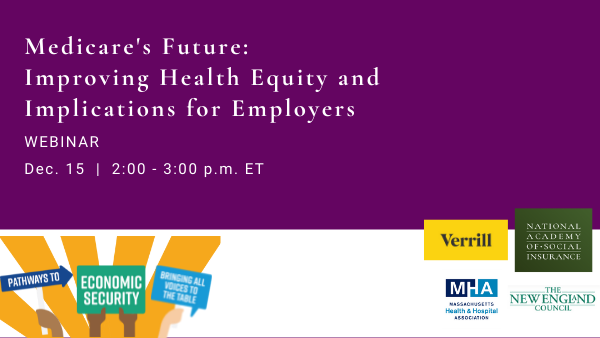Wednesday, December 15 | 2:00-3:00 p.m. ET

Employers and business executives, grassroots advocates, policymakers, educators, and other community leaders were invited to join the National Academy of Social Insurance, Verrill, the New England Council, and the Massachusetts Hospital Association for a live virtual discussion on the future of Medicare, including:
- Policy options to address issues of health equity;
- Medicare's role in building pathways to economic security; and
- Employer perspectives.
At just under $800 billion in 2019, Medicare spending accounted for 21% of total national health care expenditures. Employers and employees all have a stake in making these investments as effective as possible. For example:
- While Medicare Part A (for hospital services) is funded by payroll taxes on employers and employees, Part B (for doctor bills and other outpatient services) is funded in part by beneficiary premiums. The Centers for Medicare & Medicaid Services recently announced a 14.5% increase in the standard premium for 2022.
- Part B premiums typically are deducted from monthly Social Security checks. In 2022, Social Security beneficiaries are scheduled to see a 5.9% cost-of-living adjustment (COLA). However, affordability of health care remains a major issue for seniors of color, who rely more heavily on Social Security in retirement.
What do rising Medicare premiums mean for health equity and employers? How should we be thinking about the continued expansion of Medicare Advantage? How might the Biden Administration address both the disparities in health equity across races and cost concerns of employers?
This 60-minute webinar deepened participants' understanding of health equity, as well as policy options that may shape the future of the program and potential implications for employer costs.
Resources
Dr. Zirui Song presentation slides
Executive Summary from the Final Report of the Academy’s Study Panel on Medicare Eligibility, National Academy of Social Insurance
Potential Implications of Lowering the Medicare Eligibility Age to 60, JAMA
Improving Affordability and Equity in Medicare Advantage, Sage Publications
Public Opinion on Prescription Drugs and Their Prices, KFF
Small Business Owners' Views on Health Coverage and Costs, Public Private Strategies
Speakers
 Rhett Buttle
Rhett Buttle
Founder and President, Public Private Strategies Institute
 Juliette Cubanski
Juliette Cubanski
Deputy Director, Program on Medicare Policy, Kaiser Family Foundation
 Zurui Song
Zurui Song
Associate Professor of Health Care Policy, Department of Health Care Policy, Harvard Medical School; Assistant Professor of Medicine and Internal Medicine Physician, Department of Medicine, Massachusetts General Hospital
 Moderator: James Roosevelt, Jr.
Moderator: James Roosevelt, Jr.
Counsel, Verrill
Co-hosted by Verrill with the New England Council and the Massachusetts Hospital Association
Topics
|
Contact
|
